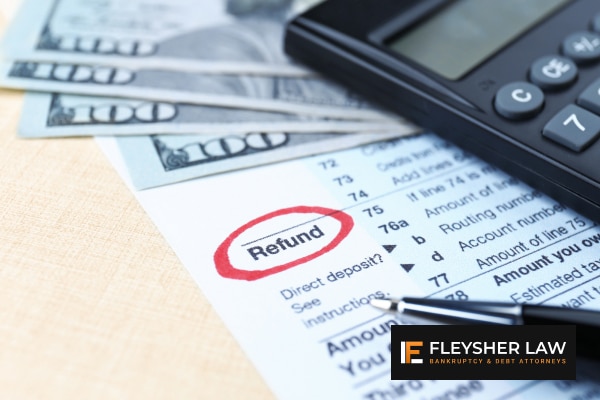This page was written, edited, reviewed & approved by Emil J. Fleysher following our comprehensive editorial guidelines. Emil J. Fleysher, the Founding Partner, has 15+ years of legal experience as a bankruptcy attorney. Our last modified date shows when this page was last reviewed.

Filing for Chapter 7 bankruptcy can lead to many questions, especially regarding how it will impact your taxes and tax returns. Understanding these implications is crucial as they can significantly affect your financial recovery and future planning.
Chapter 7 bankruptcy offers a fresh start for those overwhelmed by debt but also involves carefully considering your tax situation. Fleysher Law can explain how Chapter 7 affects tax returns, the treatment of tax debts, and strategies to protect your tax refund.
Many people worry about the impact of bankruptcy on their tax returns, particularly if they expect a refund. It's important to know that Chapter 7 bankruptcy can affect your tax refund but also offers opportunities to manage or discharge certain tax debts.
This section will help you understand the key interactions between Chapter 7 bankruptcy and your tax obligations, providing clarity and helping you plan effectively for your bankruptcy and tax situations.
Chapter 7 bankruptcy, often called liquidation bankruptcy, is designed to wipe out most of one's unsecured debts.
It allows individuals facing financial hardship to eliminate debts and start anew. During this process, a bankruptcy trustee is appointed to oversee the case, which includes selling non-exempt assets to pay creditors.
The main goal of Chapter 7 is to give you a clean financial slate, albeit with some impact on your credit score.
For many, this trade-off is worthwhile for escaping the burden of insurmountable debts. It's a legal way to resolve financial difficulties when you find yourself unable to meet debt obligations.

In Chapter 7 bankruptcy, many of your debts can be discharged, which means you are no longer legally required to pay them. This discharge typically occurs at the end of the bankruptcy process, usually a few months after filing.
Most unsecured debts, such as credit card debt, medical bills, and personal loans, can be wiped clean. The relief of having these debts discharged can significantly reduce your financial burden and stress.
However, it's important to understand that not all debts are dischargeable. Debts like student loans, child support, and certain taxes remain after the bankruptcy is finalized.
When considering bankruptcy as a solution to overwhelming debt, it's important to understand the key differences between Chapter 7 and other forms of bankruptcy, such as Chapter 13.
Each type has unique qualifications, processes, and impacts on your financial future. Below are some of the primary distinctions between Chapter 7 and other forms of bankruptcy:
Chapter 7 bankruptcy typically discharges debts faster than Chapter 13, often within three to six months.
Unlike Chapter 13, Chapter 7 may require the liquidation of assets to pay creditors. However, many personal assets can be exempt under state and federal laws.
Chapter 7 has strict income requirements; you must pass the "means test" to qualify, which is not required in Chapter 13.
Chapter 7 does not have debt limits, unlike Chapter 13, which has specific debt thresholds.
Both types of bankruptcy impact your credit, but Chapter 7 remains on your credit report for ten years, whereas Chapter 13 is generally removed after seven years.

Understanding how Chapter 7 bankruptcy affects your tax liabilities is crucial. While Chapter 7 can discharge certain tax debts, it only applies to federal income taxes at least three years old, from returns filed on time and assessed more than 240 days before filing for bankruptcy.
It's important to recognize that not all tax debts are eligible for discharge.
Tax debts eligible for discharge in Chapter 7 include federal income taxes that meet specific criteria regarding filing dates and assessment deadlines.
To have these taxes discharged, they must be thoroughly reviewed to ensure they adhere to bankruptcy code stipulations.
For taxes that are not dischargeable, Chapter 7 bankruptcy can still help manage the burden by stopping penalties and interest from accruing once the bankruptcy is filed. This pause can provide significant financial relief as you organize your finances.
Reach out to us if you have questions about your bankruptcy filing date and how it impacts your tax refund in Chapter 7.
Certain tax debts, such as recent property taxes, certain employment taxes, and penalties related to non-dischargeable taxes, cannot be wiped out in Chapter 7.
Understanding which parts of your tax debt will remain is essential for post-bankruptcy financial planning. This will likely impact your disposable income.
Yes, Chapter 7 bankruptcy can affect your tax refund. The bankruptcy trustee might consider your tax refund part of your bankruptcy estate, potentially using it to pay creditors.
However, specific exemptions might protect part or all of your refund, depending on your state's laws. We can help you maximize your exempt property.
If you file for bankruptcy before receiving your tax refund, the trustee may seize all or part of the refund, depending on the timing of the bankruptcy and the amount of the refund. Proper timing can influence whether you can keep your refund.
The timing of your bankruptcy filing when you receive your tax refund is crucial. Filing for bankruptcy after receiving and appropriately spending your refund can protect that money from being taken by the trustee.
Many states and the federal bankruptcy code provide exemptions that can partially or entirely protect your tax refund. These exemptions vary significantly, so it's important to consult with a bankruptcy lawyer to understand how they apply to your specific situation.

When filing for bankruptcy, protecting your tax refund is an important consideration, as it could be at risk of being seized to pay creditors. However, with careful planning and guidance from a qualified bankruptcy attorney, you can take steps to safeguard your refund.
Here are several strategies to help protect your tax refund during bankruptcy:
Understanding the exemptions that apply to your case can help protect your refund.
Timing your bankruptcy filing after spending your tax refund on necessary expenses can help protect it from seizure.
Apply available exemptions to protect as much of your refund as possible.
Maintaining detailed records of how your tax refund is spent can be crucial if the bankruptcy trustee examines the usage.
Different states offer varying levels of protection for tax refunds under bankruptcy; know what's available in your state.
If you receive a tax refund before filing for bankruptcy, spend it on exempt or necessary items like rent, mortgage, or food.
Keep your lawyer informed about your tax situation, including any expected refunds.
Before filing for Chapter 7 bankruptcy, it’s important to address any tax-related matters to ensure a smooth process and protect your financial interests.
Taking the right steps regarding your taxes can help you avoid complications and maximize the benefits of your bankruptcy filing. Here are some essential steps to take before filing for Chapter 7 bankruptcy:
Ensure all tax returns are filed up to date before filing for bankruptcy.
Understanding your current tax liabilities can influence your bankruptcy strategy.
Timing your bankruptcy to maximize the protection of your assets, including tax refunds, is crucial.
Having all financial records, including past tax returns and receipts, can help assess your situation more accurately.
Know which taxes may be eligible for discharge and plan accordingly.
A skilled and experienced lawyer can provide guidance on how bankruptcy affects your specific tax situation.
Understand how to manage taxes post-bankruptcy to avoid falling into new tax debts.
Filing for Chapter 7 bankruptcy can be a complex and overwhelming process, especially when dealing with tax issues and creditor actions.
Having a Florida Chapter 7 bankruptcy lawyer by your side can make all the difference in securing a successful outcome and protecting your financial future.
Here’s why you need the help of a bankruptcy attorney now:
A skilled lawyer can navigate the complex interplay between bankruptcy and tax laws to benefit your situation.
During bankruptcy, an attorney can stop creditors from garnishing your wages or seizing assets, including tax refunds.
Professional legal advice is critical for making informed decisions about when and how to file to protect your assets and future financial stability.
Having a repayment plan can help when managing bills and filing taxes. We are here to help you get ready for a fresh start. We always put our clients first.

If you're considering Chapter 7 bankruptcy and are concerned about how it might affect your income tax return, don't wait. Fleysher Law is ready to help you. Our experienced Florida bankruptcy lawyers can help you review your options and walk you through bankruptcy.
If you owe taxes, a bankruptcy discharge could be right for you. Bankruptcy court and tax withholding topics can be confusing, but avoid facing these issues yourself. Contact us today to schedule a free consultation to discuss your bankruptcy case.

Emil specializes in consumer bankruptcy, debt settlement, and mortgage modification, offering a holistic approach to solving mortgage and debt problems. Emil listens to clients, understands their circumstances and goals, and helps them make the right choices by presenting all options and contingencies.
He is dedicated to helping South Floridians regain their financial freedom from overwhelming debt caused by high interest credit cards, bad mortgage loans, and uninsured medical expenses.

"*" indicates required fields